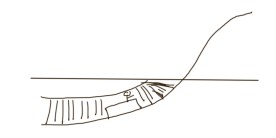We often hear that life is like a rollercoaster.

We get tossed and turned through its ups and downs, thrown mercilessly from one extreme to another.
When we are on top its a high. We look down upon the world and feel like we can do anything.

But then there is the fall.

Which can be sudden and frightening.
We can find ourselves plunged into darkness. Sad. Alone. Unable to see the light.

This can be seconds, months, years…
But eventually we come out

And start the process all over again.
After years and years of being on the roller coaster.
 We ask ourselves, does it have to be this way? Do I have to be thrown around by life?
We ask ourselves, does it have to be this way? Do I have to be thrown around by life?
And then you realise, there is actually a door on the roller coaster.

You can step out.

And plant two feet firmly on the ground.
 The rollercoaster stands tall above you and is still moving.
The rollercoaster stands tall above you and is still moving.

But you simply watch in stillness and in peace.
When it plunges downward, you continue watching.
This is not to say you don’t feel the emotions you felt on that rollercoaster.
We all have an inner theme park within us so the emotions will still happen.

But you are simply now watching the rollercoaster make its way up. You vicariously feel the high. When the rollercoaster plunges down, you also observe the despair and pain. However this is all now from the ground, all from a place of calm.

You feel stillness and your emotions at exactly the same time.
Because you know you are safe, you don’t have to be scared about what is happening. Especially when the rollercoaster plunges into the dark. You don’t have to close your eyes anymore. You can look and really see what is happening.
When you do, you may discover something very surprising.

That you constructed this inner rollercoaster yourself.

Even those very dark tunnels.
Which means, that you can choose to reconstruct your rollercoaster in a different way.
Only after you’ve fully observed and understood the structure of the rollercoaster of course.


So the next time you find yourself being tossed and turned around by what would appear to be external circumstances, use it as an opportunity to get off the rollercoaster and observe it. Even reconstruct it if you want to.
Stillness is possible.

Afterword
This was the analogy that emerged in my head when I tried to explain to a friend about being the observer of our thoughts and emotions, and also about how meditation features in all of this.
Although there are many types of meditation each with different goals, one of the key things it does is to allow yourself to access the space, quiet and stillness that exists within. It also helps you access your inner observer. You no longer become your thoughts and emotions. You are just the neutral person hearing and feeling them.
Some people get frustrated with meditational practices because they can’t get their mind and emotions to quiet down. They think that by meditating they should be achieving a state of complete emptiness straight away.
Although this may be a state we may someday achieve, trying to repress what is bubbling up from inside will just make you feel frustrated with the practice, making it counterproductive. In fact, when meditating what you are doing is accessing more of who you really are. So all the thoughts and emotions that you didn’t want to look at will eventually come to the surface.
Accept them, embrace them and let them go. That’s what they wanted you to do in the first place 🙂 Then just gently return to your meditation (e.g., following your breath).
And remember, you don’t need to be tossed and turned mercilessly by life! Objectively life may throw you the biggest curve balls, but you can remain still within
Recommended Reading
Although my obvious reading choices for this post would be The Power Of Now – A Guide To Spiritual Enlightenment by Eckhart Tolle and The Untethered Soul: The Journey Beyond Yourself by Michael A Singer, for this post I recommend also a book written by the latter author, The Surrender Experiment: My Journey into Life’s Perfection. An absorbing and inspiring account of how a man remained in his place of stillness even when the s**t really hit the fan (I’m talking being arrested by the FBI for a crime he did not commit!).

